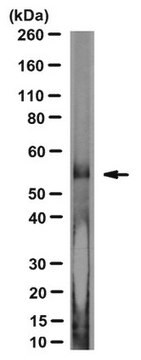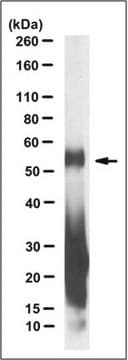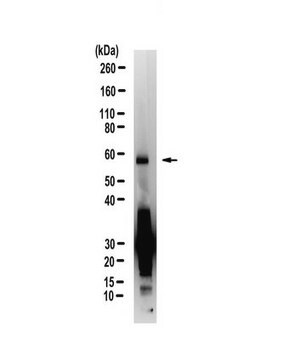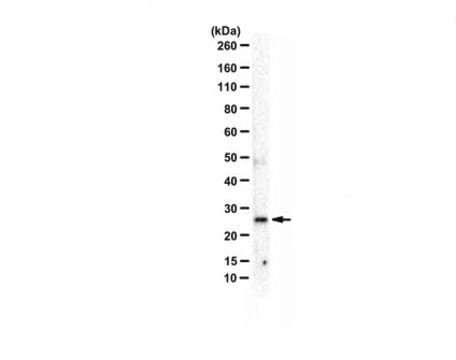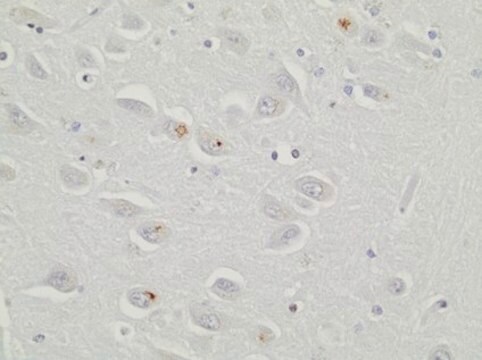推荐产品
生物源
rabbit
品質等級
抗體表格
serum
抗體產品種類
primary antibodies
無性繁殖
polyclonal
物種活性
human
技術
dot blot: suitable
immunofluorescence: suitable
immunohistochemistry: suitable
western blot: suitable
NCBI登錄號
UniProt登錄號
運輸包裝
ambient
目標翻譯後修改
unmodified
基因資訊
human ... C9orf72(203228)
一般說明
Expansion of a GGGGCC (G4C2) hexanucleotide repeat sequence in the non-coding region of human chromosome 9 open reading frame 72 or C9orf72 (also known as ALSFTD, FTDALS; Gene ID 203228) is the most common genetic abnormality in familial and sporadic frontotemporal dementia (FTD) and motor neuron disease (MND), with amyotrophic lateral sclerosis (ALS) as the most frequent form. The number of hexanucleotide repeats in the normal population ranges from 2 to 24, whereas up to several thousand repeats (700 - 4,400 repeats) are found in the pathologically expanded allele. Unconventional repeat-associated non-ATG-initiated translation (RANT) of the GGGGCC repeats in the three alternate reading frames from both sense and antisense transcripts generates five types of dipeptide repeat (DPR) protein species, each composed of repeating units of two amino acids, glycine-alanine (GA), glycine-proline (GP), glycine-arginine (GR), alanine-proline (AP), proline-arginine (PR), respectively. The sense transcript (5′-GGGGCC-3′ hexanucleotide repeats) is translated through repeat-associated non-ATG (RAN) translation such that poly- (Gly- Ala), poly-(Gly-Pro), and poly-(Gly-Arg) proteins were produced. The anti-sense transcript (containing 5′-GGCCCC-3′ (G2C4) hexanucleotide repeats is translated through repeat-associated non-ATG (RAN) translation producing poly-(Pro-Ala), poly- (Pro-Arg), poly- (Gly-Pro) proteins. The antisense proteins accumulate in cytoplasmic aggregates in affected brain regions, including the frontal and motor cortex, hippocampus, and spinal cord neurons.
特異性
This polyclonal antibody recognizes C9ORF72/C9RANT (poly-PA).
免疫原
Epitope: unknown
H2N-APAPAPAPAPAPAPACKKKK-amide.
應用
Anti-C9ORF72/C9RANT (poly-PA), Cat. No. ABN1356, is a highly specific rabbit polyclonal antibody that targets C9ORF72(poly-PA) and has been tested in Dot Blot, Immunofluorescence, Immunohistochemistry, and Western Blotting.
Immunofluorescence Analysis: A representative lot detected C9ORF72/C9RANT (poly-PA) in transfected HEK293T Flag-PA cells (Zu, T., et. al. (2013). Proc. Natl. Acad. Sci. USA. 110(51):E4968-77).
Immunofluorescence Analysis: A 1:500 dilution from a representative lot detected C9ORF72/C9RANT (poly-PA) in Flag-PA trannsfected HEK293T cells (Courtesy of Dr. Laura P.W. Ranum and Dr. Lien Nguyen from the University of Florida).
Western Blotting Analysis: A representative lot detected C9ORF72/C9RANT (poly-PA) in recombinant Protein (Zu, T., et. al. (2013). Proc. Natl. Acad. Sci. USA. 110(51):E4968-77).
Immunohistochemistry Analysis: A representative lot detected C9ORF72/C9RANT (poly-PA) in aggregates found in neurons of the CA and DG regions of the hippocampus (Zu, T., et. al. (2013). Proc. Natl. Acad. Sci. USA. 110(51):E4968-77).
Dot Blotting Analysis: A representative lot detected C9ORF72/C9RANT (PR-CT) in Dot Blotting applications (Zu, T., et. al. (2013). Proc Natl Acad Sci USA. 110(51):E4968-77).
Immunofluorescence Analysis: A 1:500 dilution from a representative lot detected C9ORF72/C9RANT (poly-PA) in Flag-PA trannsfected HEK293T cells (Courtesy of Dr. Laura P.W. Ranum and Dr. Lien Nguyen from the University of Florida).
Western Blotting Analysis: A representative lot detected C9ORF72/C9RANT (poly-PA) in recombinant Protein (Zu, T., et. al. (2013). Proc. Natl. Acad. Sci. USA. 110(51):E4968-77).
Immunohistochemistry Analysis: A representative lot detected C9ORF72/C9RANT (poly-PA) in aggregates found in neurons of the CA and DG regions of the hippocampus (Zu, T., et. al. (2013). Proc. Natl. Acad. Sci. USA. 110(51):E4968-77).
Dot Blotting Analysis: A representative lot detected C9ORF72/C9RANT (PR-CT) in Dot Blotting applications (Zu, T., et. al. (2013). Proc Natl Acad Sci USA. 110(51):E4968-77).
Research Category
Neuroscience
Neuroscience
品質
Evaluated by Western Blotting in lysate from HEK293 cells transfected with Flag-PA.
Western Blotting Analysis: A 1:1,000 dilution of this antibody detected C9ORF72/C9RANT (poly-PA) in 10 µL of lysate from HEK293 cells transfected with Flag-PA.
Western Blotting Analysis: A 1:1,000 dilution of this antibody detected C9ORF72/C9RANT (poly-PA) in 10 µL of lysate from HEK293 cells transfected with Flag-PA.
標靶描述
~35 kDa observed. Uncharacterized bands may be observed in some lysate(s).
外觀
Unpurified
Rabbit polyclonal serum with 0.05% sodium azide.
儲存和穩定性
Stable for 1 year at -20°C from date of receipt.
Handling Recommendations: Upon receipt and prior to removing the cap, centrifuge the vial and gently mix the solution. Aliquot into microcentrifuge tubes and store at -20°C. Avoid repeated freeze/thaw cycles, which may damage IgG and affect product performance.
Handling Recommendations: Upon receipt and prior to removing the cap, centrifuge the vial and gently mix the solution. Aliquot into microcentrifuge tubes and store at -20°C. Avoid repeated freeze/thaw cycles, which may damage IgG and affect product performance.
其他說明
Concentration: Please refer to lot specific datasheet.
免責聲明
Unless otherwise stated in our catalog or other company documentation accompanying the product(s), our products are intended for research use only and are not to be used for any other purpose, which includes but is not limited to, unauthorized commercial uses, in vitro diagnostic uses, ex vivo or in vivo therapeutic uses or any type of consumption or application to humans or animals.
Not finding the right product?
Try our 产品选型工具.
儲存類別代碼
12 - Non Combustible Liquids
水污染物質分類(WGK)
WGK 1
Stina Leskelä et al.
Biochimica et biophysica acta. Molecular cell research, 1868(7), 119021-119021 (2021-03-30)
C9orf72 hexanucleotide repeat expansion (HRE) is the major genetic cause underpinning frontotemporal lobar degeneration (FLTD) and amyotrophic lateral sclerosis (ALS). C9orf72 HRE-associated pathogenesis involves both loss-of-function, through reduced C9orf72 levels, and gain-of-function mechanisms, including formation of RNA foci and generation
Stina Leskelä et al.
Molecular neurobiology, 58(11), 5438-5458 (2021-07-31)
Frontotemporal lobar degeneration (FTLD) is a clinically, genetically, and neuropathologically heterogeneous group of neurodegenerative syndromes, leading to progressive cognitive dysfunction and frontal and temporal atrophy. C9orf72 hexanucleotide repeat expansion (C9-HRE) is the most common genetic cause of FTLD, but pathogenic
我们的科学家团队拥有各种研究领域经验,包括生命科学、材料科学、化学合成、色谱、分析及许多其他领域.
联系技术服务部门

